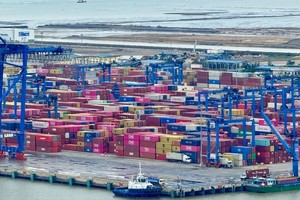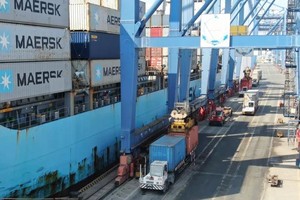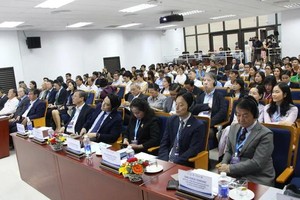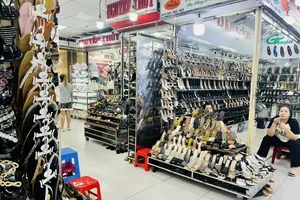 |
Production at a company in HCMC. (Photo: SGGP) |
Over 7,500 enterprises have registered to suspend business operations for a certain period and complete dissolution procedures since the beginning of this year. This figure has lengthened the list of businesses that are facing difficulties and being forced to exit the market.
Many sectors experience slumps
According to Mr. Nguyen Phuoc Hung, Vice Chairman of the Ho Chi Minh City Unions of Business Association, a recent survey conducted on HCMC-based enterprises in February and March revealed that 83 percent of businesses are encountering difficulties. These difficulties include a narrowed market (41.2 percent), high inventory (30.1 percent), increased input material prices (17.6 percent), capital constraint (40 percent), high loan interest rates (43 percent), and complicated and time-consuming loan procedures (38.2 percent).
Furthermore, Mr. Pham Xuan Hong, Chairman of the Ho Chi Minh City Textile, Embroidery and Knitting Association, added that garment and textile enterprises faced difficulties not only due to the lack of orders but also because of high interest rates and fluctuating US dollar exchange rates. This led to negative impacts on the import of raw materials for export processing, resulting in a decline in profits at the beginning of 2023.
The handicraft and wood processing industries have also been heavily affected, with orders sharply declining since the beginning of the year and expected to decrease by 50 percent-60 percent until the end of the second quarter of 2023. The reduction in orders is due to poor consumption in European and American markets, as well as limited procurement and construction by people and businesses domestically. As for food enterprises, they need to advance costs for new crops but are struggling to access loans.
The market, both at home and abroad, has also been affected by inflation, resulting in a narrowed business scale and halted investments and construction of new projects. This has led to a 60 percent drop in steel prices year-on-year, with a reduction of 69.3 percent in steel export volume. Cement factories are also experiencing stagnation, with a decrease of 55 percent in exports. The domestic market has declined due to the freezing of public investment and real estate projects. As a result, not only do businesses face debt issues but employees are also being laid off, severely impacting their lives and social security.
Urgent solutions put forward
Mr. Nguyen Phuoc Hung said that enterprises have proposed urgent solutions to help alleviate the current difficulties, which include implementing effective credit support policies for businesses, developing a policy package to stabilize the market, carrying out administrative reform, restarting investment stimulus loan programs, increasing trade promotion and sales support, having clear policies consistent with planning, construction, and land issues, and having specific strategies to support businesses in digital transformation.
 |
Vietnamese enterprises try to find partners and sell products at an exhibition program. (Photo: SGGP) |
Additionally, banks need to identify the difficulties of each industry to have appropriate support policies for businesses, increase the mobilization of available and unused deposit sources of the State budget to provide loans and expand lending conditions in terms of mortgage rates and mortgage loans. Moreover, the loan extension policy in 2023 for medium and long-term loans should be prolonged, with a one-year grace period instead of merging repayment in the following year.
Leaders of some businesses have expressed concerns about the bond and real estate markets and have recommended that the government develop a policy package to stabilize these markets. This could involve speeding up public investment capital disbursement, removing bottlenecks in the real estate sector, and developing the social housing market. Moreover, the government should continue prioritizing administrative reform, creating an open corridor for enterprises to thrive.
Another perspective comes from Mr. Tran Viet Anh, General Director of Thai Son Nam Import-Export Joint Stock Company and Chairman of Thu Duc City Business Association. He suggested that relevant authorities should focus on strengthening trade promotion activities and provide support for sales, helping businesses connect directly with key export markets or those that offer export advantages, such as India and Europe.
Regarding planning, construction, and land issues, the business community is urging the State to conduct a quick study and provide specific regulations for appropriate land use regimes for multi-purpose construction works with accommodation functions, such as hotel apartments (condotels), office apartments (officetels), and commercial townhouses (shophouses). Furthermore, the conditions for foreigners to buy houses should be loosened to solve difficulties investors face when handling public land interspersed in the project so as to quickly release social resources and support the stable development of the real estate market, thereby contributing to economic recovery.
In addition to the above solutions, many businesses also suggest that the city authorities conduct a survey of current land use to identify and address issues of fallow land. It is necessary to convert unusable agricultural land to other land types with higher economic efficiency to utilize land resources to contribute to city development. Moreover, businesses need financial support for propaganda, training, and encouraging digital transformation.
























